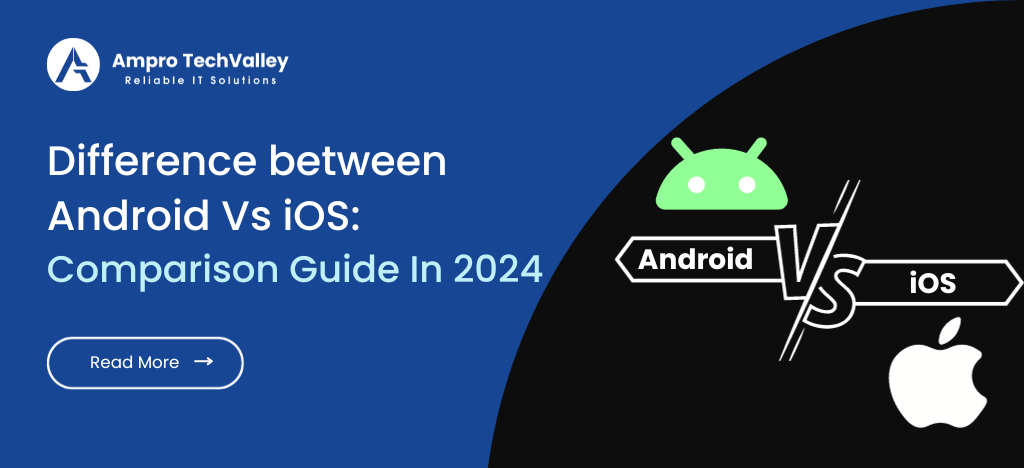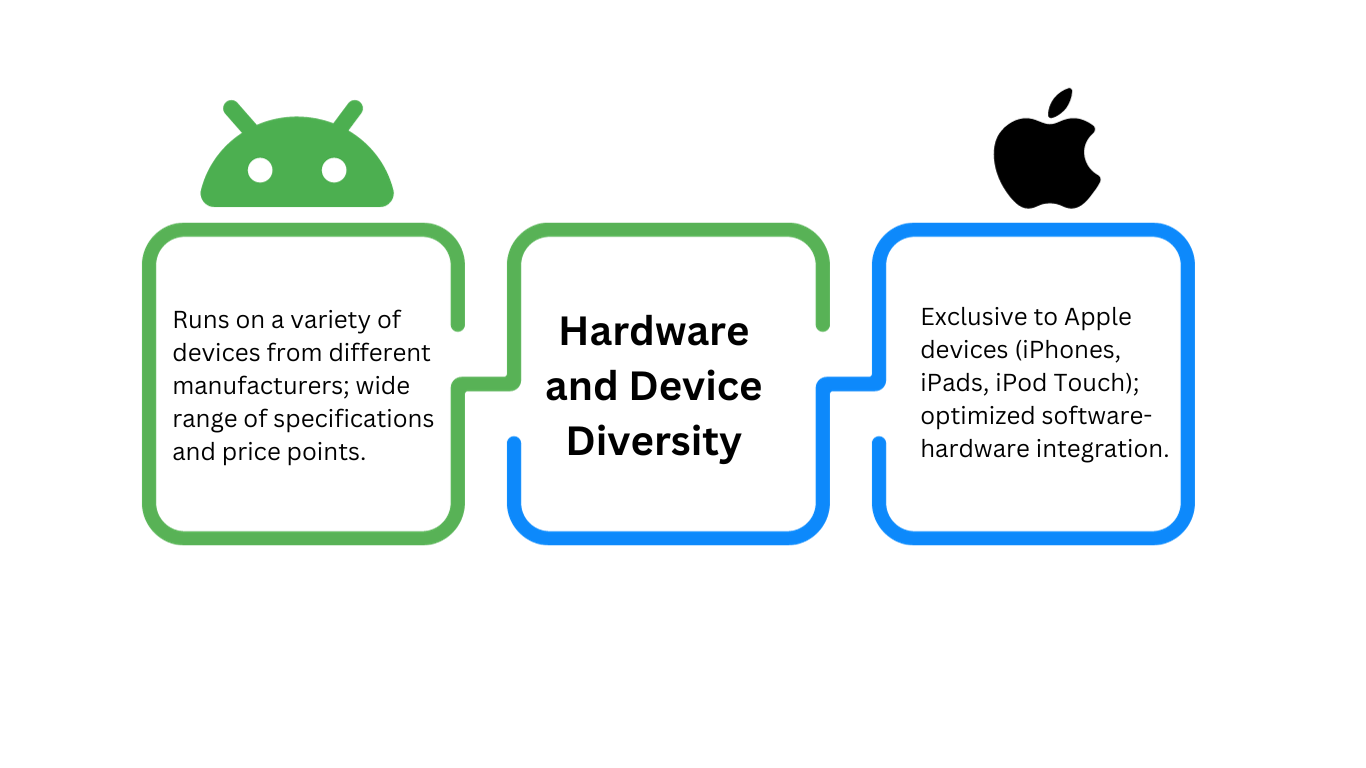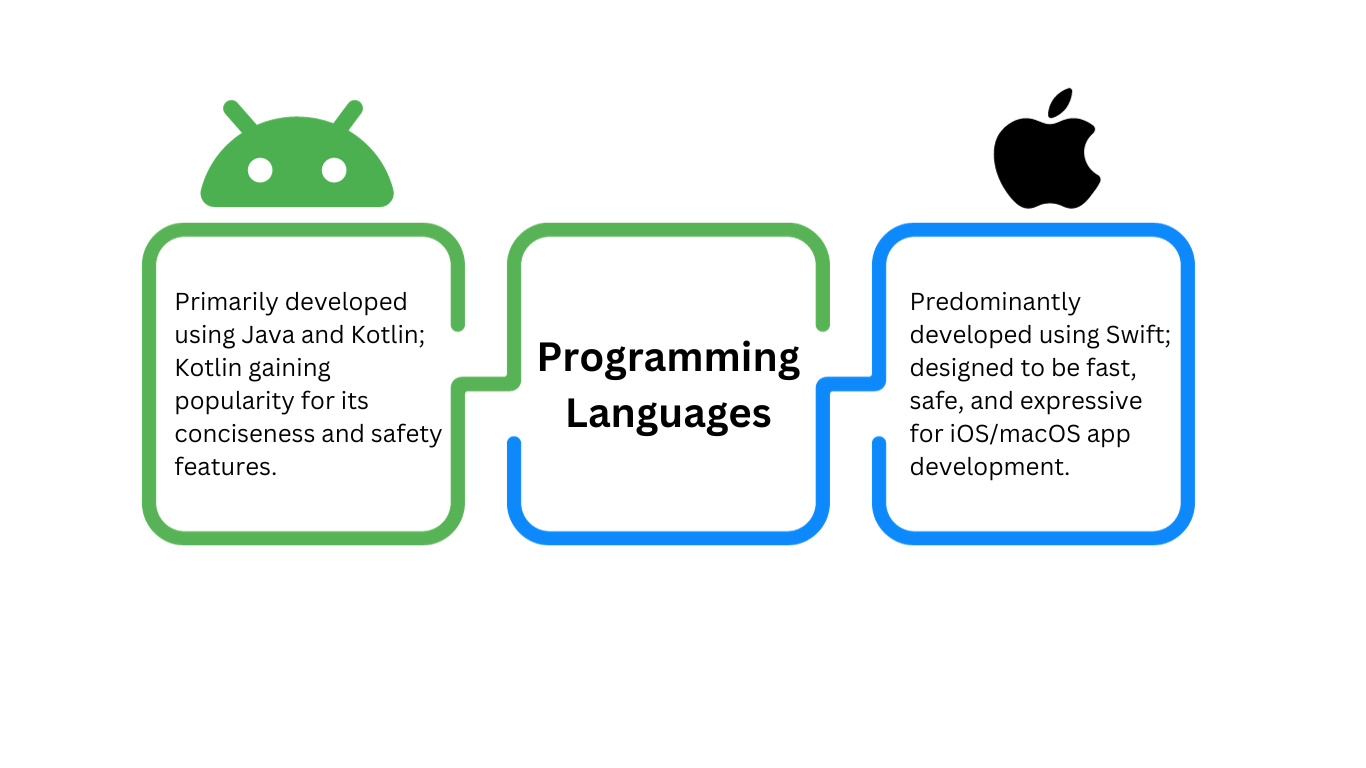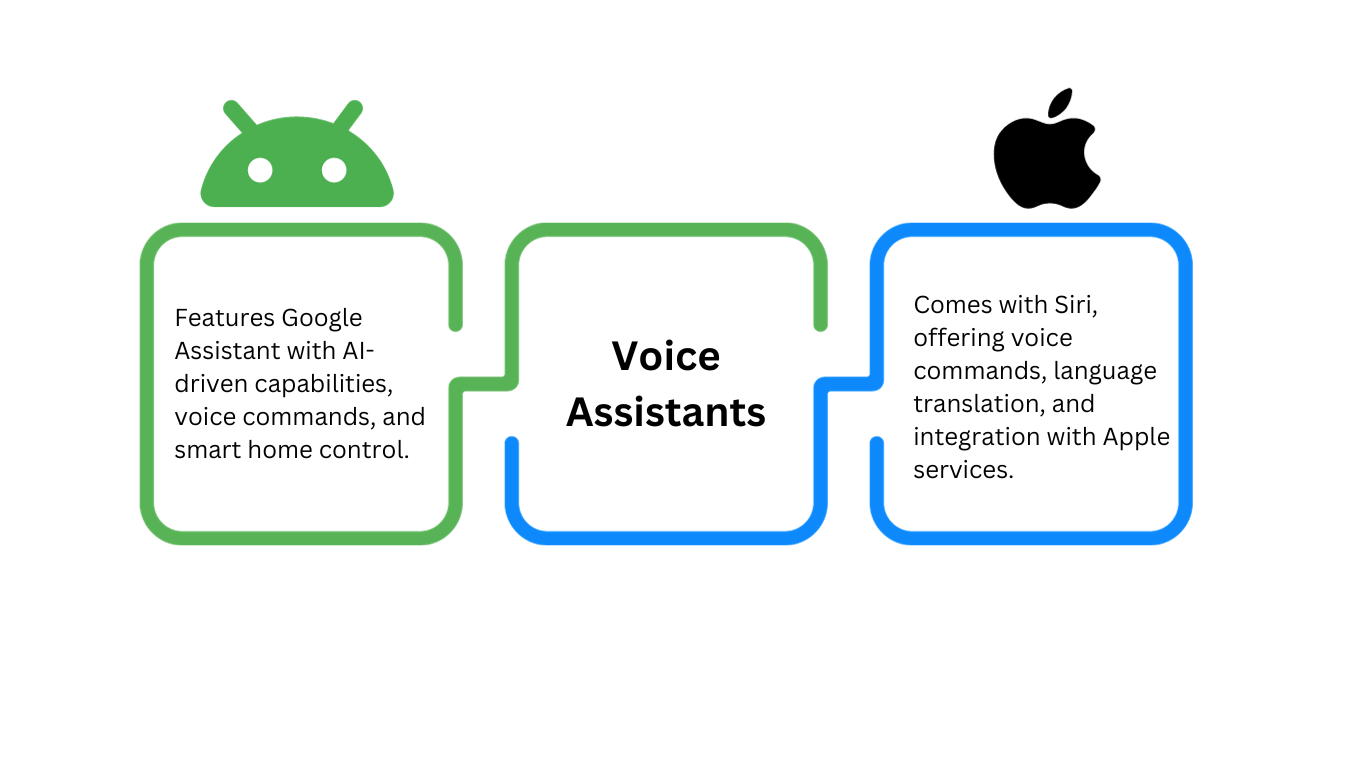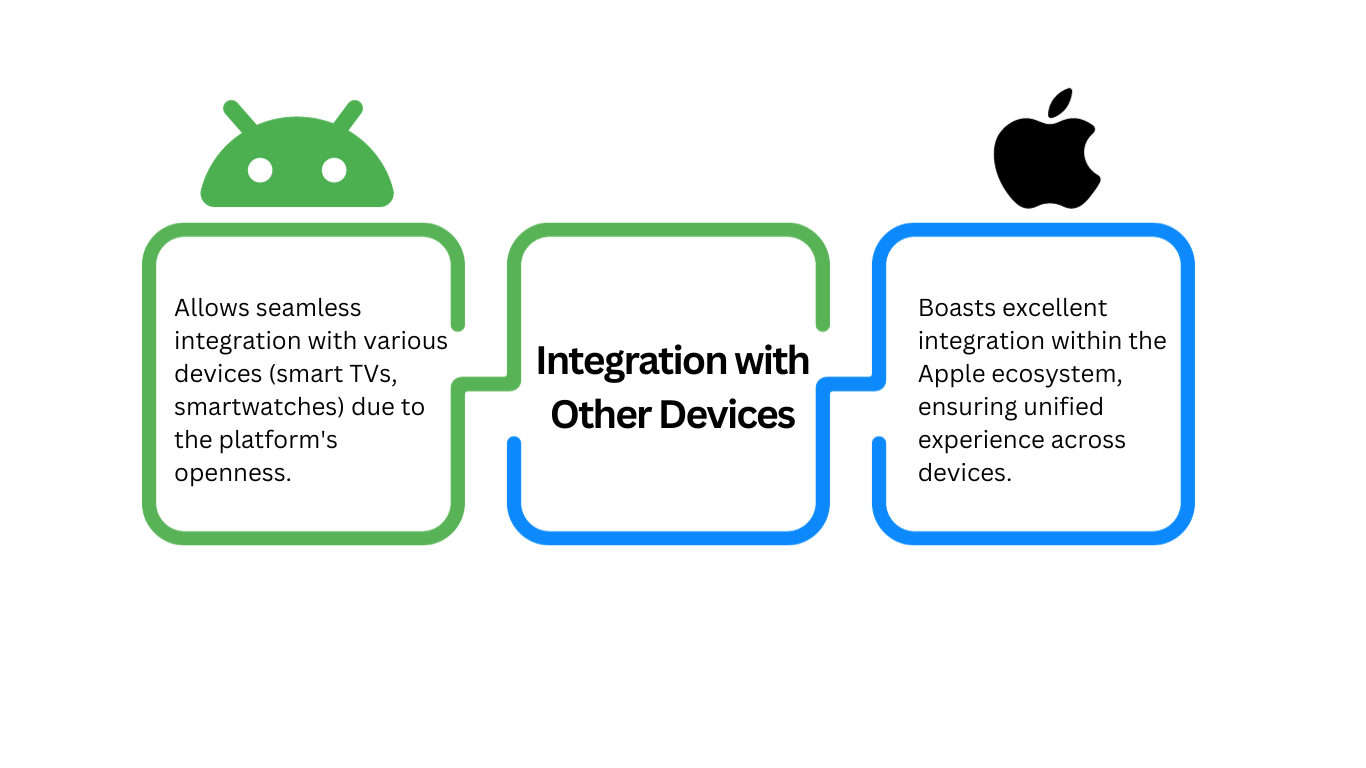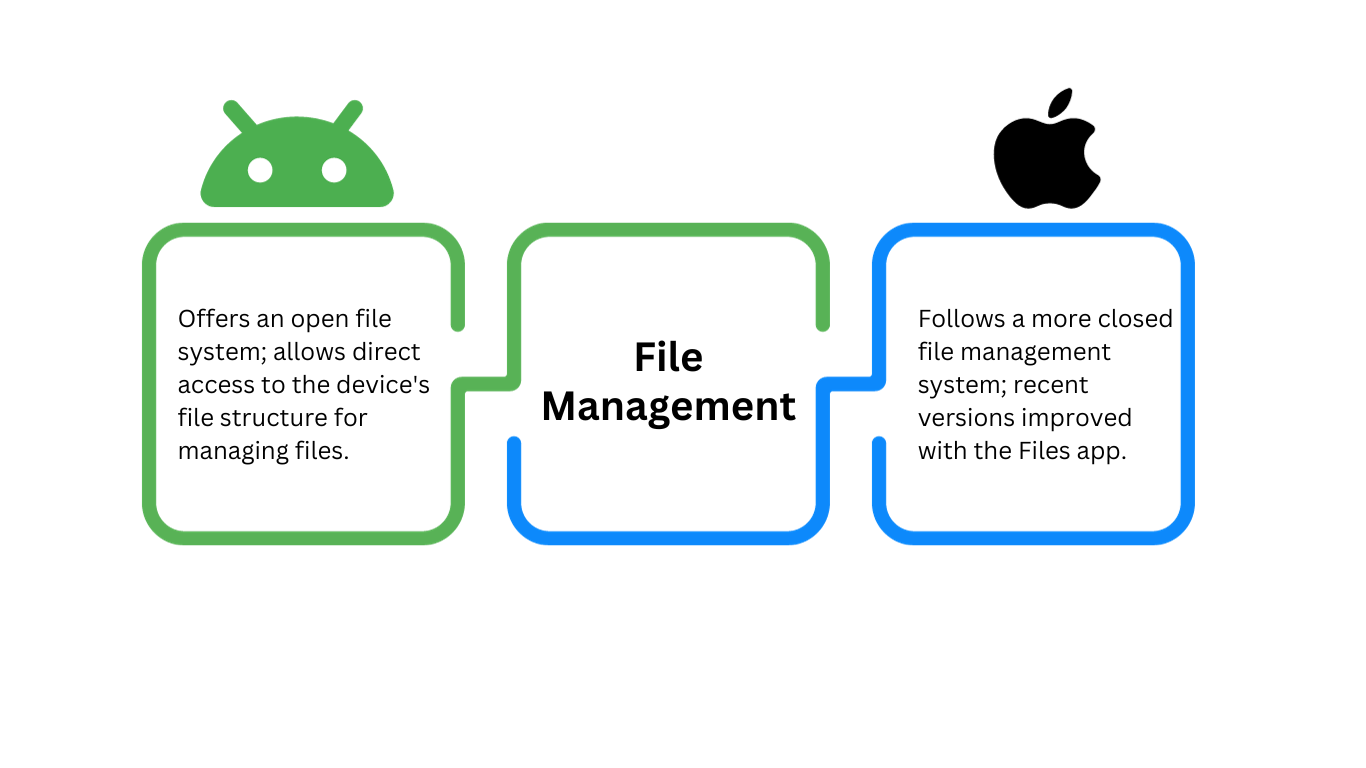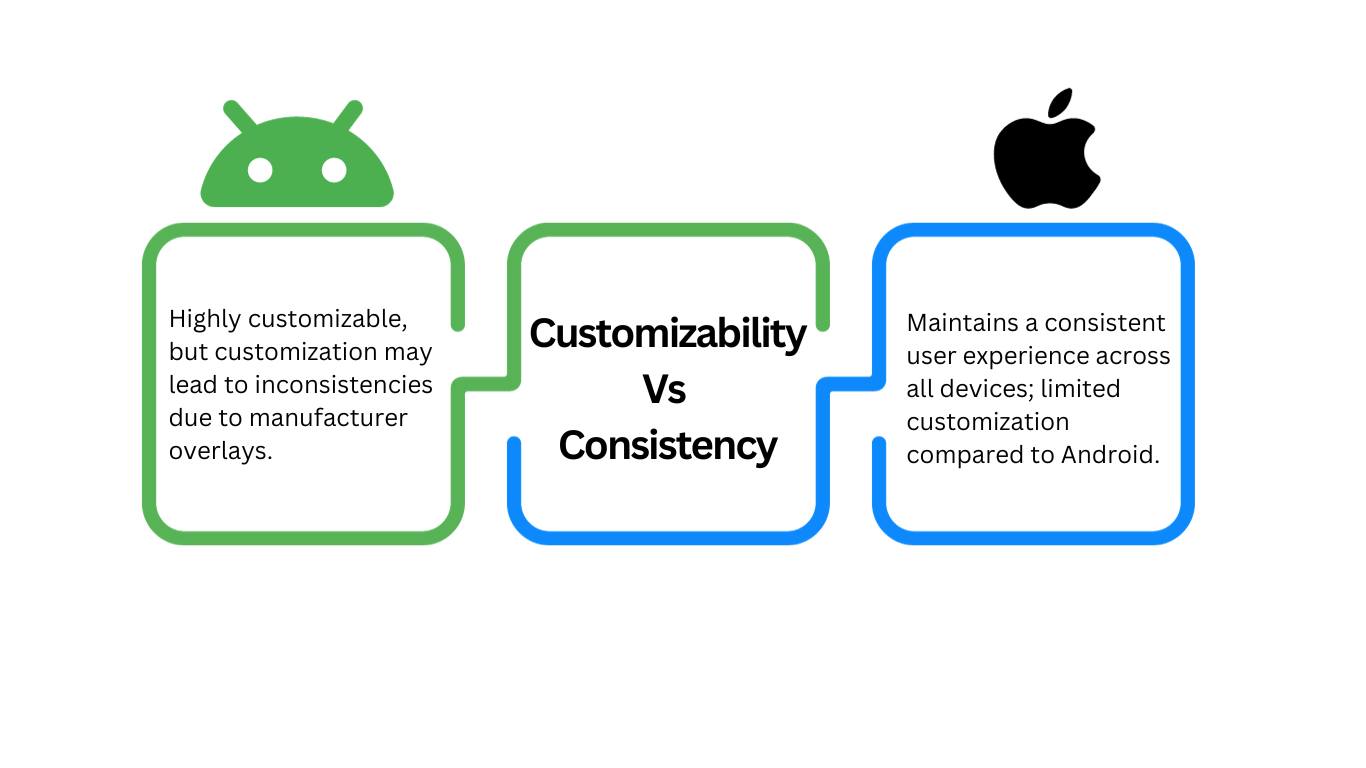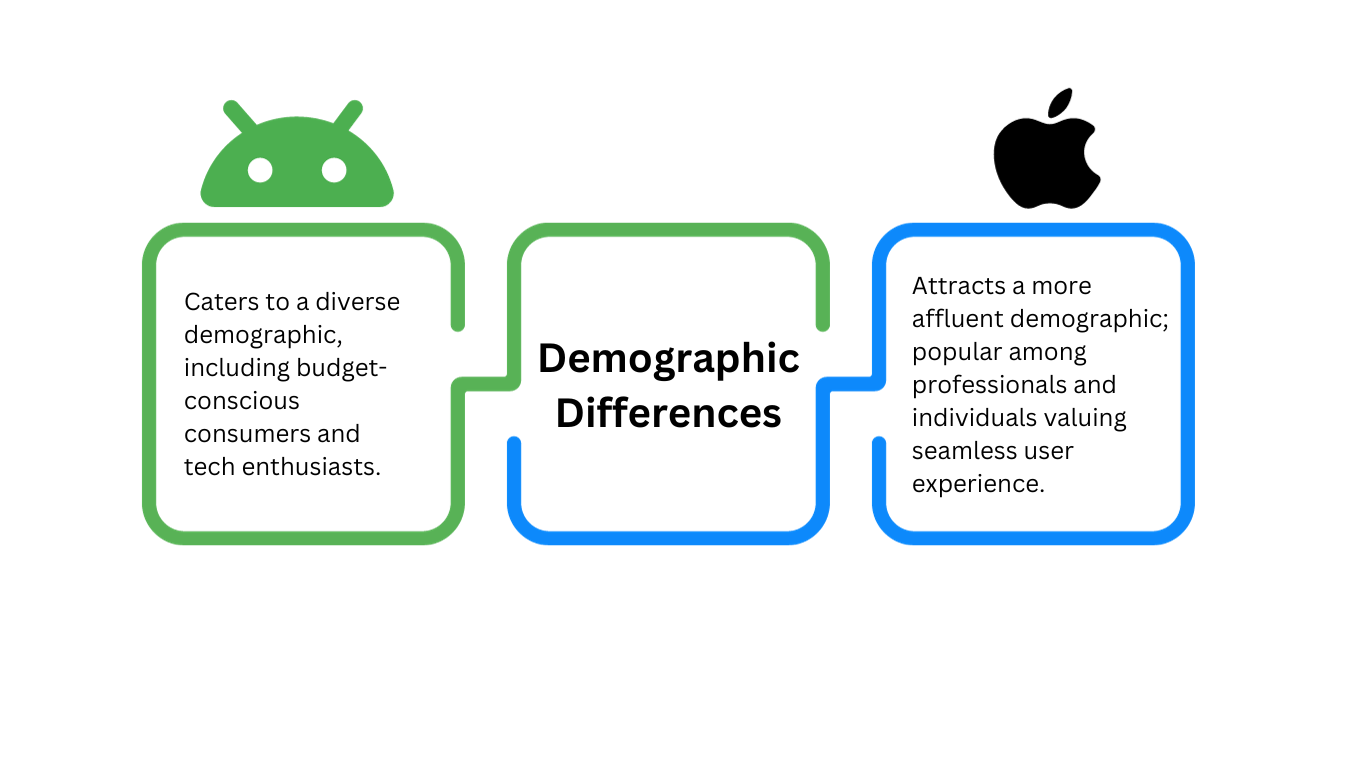Both the Android and iOS differences have dedicated user bases and unique features that make them stand out. Both consumers and developers must understand the Android vs. iOS differences. In this comprehensive analysis, we delve into the fundamental Android vs. iOS differences to help you make informed decisions about smartphones and mobile applications.
Android Vs iOS Differences: Right choice
The world of mobile operating systems has been taken over by iOS and Android. The user interfaces, customization options, and app ecosystems of Google’s Android and Apple Inc.’s iOS vary. Here is a quick overview of Android Vs iOS Differences.
1. User Interface and Customization
Android:
Users may add custom emulators, customize their home screens, and select from a wide variety of gadgets. Because of the customization layers added by manufacturers like Samsung, One Plus, and Xoimi, the user interface differs greatly between various Android devices.
iOS:
However, iOS offers a simple and uniform user interface for all devices. While iOS offers limited customization compared to Android, its simplicity and uniformity enhance the user experience.
2. App Ecosystem
Android:
The Google Play Store hosts a vast collection of apps, ranging from free to paid, catering to diverse user needs. The open nature of Android allows developers to create and distribute apps without stringent approval processes.
iOS:
The best apps in Apple’s App Store are often personally picked and have high standards. The App Store is more restricted than the Google Play Store.
3. Hardware and Device Diversity
Android:
Android operating system It runs for many manufacturers, like Samsung, LG, Google, and OnePlus. These devices are spread worldwide and used by millions of users.
iOS:
iOS devices like iPhones, iPads, iWatches, and Macbooks are considered prestigious. While this limited device range ensures optimized software-hardware integration, it restricts users’ choices to Apple products.
4. Programming Languages
Android:
Java and Kotlin Are the most used languages. Java is a powerful, adaptable, and popular language. Kotlin, which was first released by JetBrains, was developed with safety features and ease of use.
iOS:
The majority of iOS applications are created with Swift, an effective and user-friendly programming language that Apple debuted in 2014. Swift has essentially replaced Objective-C in the creation of iOS apps because of its improved performance and current syntax.
5. Security and Privacy
Android:
Android prioritizes your privacy and security by allowing you to control which apps can access your information.
iOS:
Apple ensures your privacy and security with robust measures. They use end-to-end encryption to keep your data safe and transparently monitor apps for added security.
6. Voice Assistants
Android:
Android devices typically feature Google Assistant, a powerful AI-driven virtual assistant that integrates seamlessly with Google services. It offers voice commands, smart home control, and personalized recommendations.
iOS:
Apple devices come with Siri, Apple’s virtual assistant, offering voice commands, language translation, and integration with Apple services. While Siri has a loyal user base, some users find it less intuitive compared to Google Assistant.
7. Integration with Other Devices
Android:
The platform’s flexibility allows developers to create a wide range of apps that are suitable for different kinds of devices.
iOS:
Excellent ecosystem integration is a feature of iOS. To provide a seamless transition between iPhones, iPads, Macs, and other Apple products, iCloud integrates data between devices.
8. File Management
Android:
With Android, users may instantly view their device’s file structure thanks to a more transparent file system.
iOS:
iOS follows a more closed file management system, restricting direct access to the file system. While recent iOS versions have improved file management with the Files app, the system maintains a level of control, ensuring a secure environment.
9. Software Updates
Android:
Manufacturers and carriers issue Android updates, leading to divisions where various devices utilize different versions of the operating system.
iOS:
As Apple manages iOS upgrades directly, updates are sent immediately to all supported devices, ensuring that users receive the most recent features, security fixes, and enhancements on time.
10. Customizability Vs Consistency
Android:
Android’s open nature allows users to customize nearly every aspect of their device, from the launcher to system fonts. While this flexibility provides a personalized experience, it can sometimes result in a lack of consistency across different Android devices due to manufacturer overlays and software modifications.
iOS:
iOS maintains a consistent user experience across all Apple devices. While customization options are limited compared to Android, this uniformity ensures that apps and features work seamlessly without variation, providing users with a reliable and predictable interface.
11. Market Shares
Android:
Android sets market share worldwide because of cost-effective smartphones. According to the latest research, Android holds a significant market share due to its wide range of operating systems around the globe.
iOS:
iOS stands for high quality, and iPhones have a devoted following of users. Though iOS has a lower market share than Android, it is still a major player in the market for high-end smartphones.
12. Development Cost Difference
Android:
Designing Android apps is frequently less expensive. Likewise, there is no initial cost for developers because Android development tools, such as Android Studio, are free and open-source.
iOS:
iOS app development can be relatively costlier due to the need for Mac hardware, which is essential for running XCode, the official integrated development environment for iOS app development. Macs, being premium devices, contribute to higher upfront costs for iOS developers. However, the robustness of Apple’s development ecosystem and potential revenue through the App Store can offset these initial expenses.
13. Demographic Differences
Android:
Android devices cater to a diverse demographic, ranging from budget-conscious consumers in emerging markets to tech enthusiasts and professionals. Android’s affordability and availability on various devices make it accessible to people from various socioeconomic backgrounds.
iOS:
iOS devices, being premium products, tend to attract a more affluent demographic. Apple users often value the brand’s reputation for quality, design, and security. iOS devices are popular among professionals, creatives, and individuals who prioritize a seamless user experience and are willing to invest in high-end technology.
14. Approval Process
Android:
Publishing an app on the Google Play Store involves a relatively straightforward approval process. Clear bug-free application and policy violations, but the process is usually quicker and easier, because of which the developers put their apps in front of customers sooner.
iOS:
Apple reviews apps meticulously, ensuring they meet strict quality and security standards. While this process can be more time-consuming, it guarantees a higher level of app quality and user safety for iOS users.

How can Ampro TechValley solve your iOS and Android app development needs?
Ampro TechValley’s expertise and flexibility make it a great partner for iOS app development and Android app development. A team that uses its expertise in Java, Kotlin, Swift, and other programming languages to develop simple-to-use creative applications, regardless of whether you are aiming for a vast Android user base or a specific iOS audience, With Ampro TechValley, you receive a dependable partner that can provide outstanding apps for iOS and Android with Android vs. iOS differences, effectively and efficiently satisfying the particular needs of your target audience. For more question-related queries, click on the image given below.
Conclusion
To sum everything up, the Android vs. iOS differences bring to light the unique qualities and attributes that set these two popular mobile operating systems apart. To make well-informed judgments based on their preferences and requirements, users and developers need to carefully analyze those differences. Selecting the appropriate partner for app development is essential in this environment. An experienced development team with in-depth knowledge of platforms and programming languages guarantees the production of excellent, user-friendly applications. Such knowledge ensures customized solutions that successfully address the distinct needs of diverse customer populations. Selecting the best app development partners enables companies and people to flourish.

